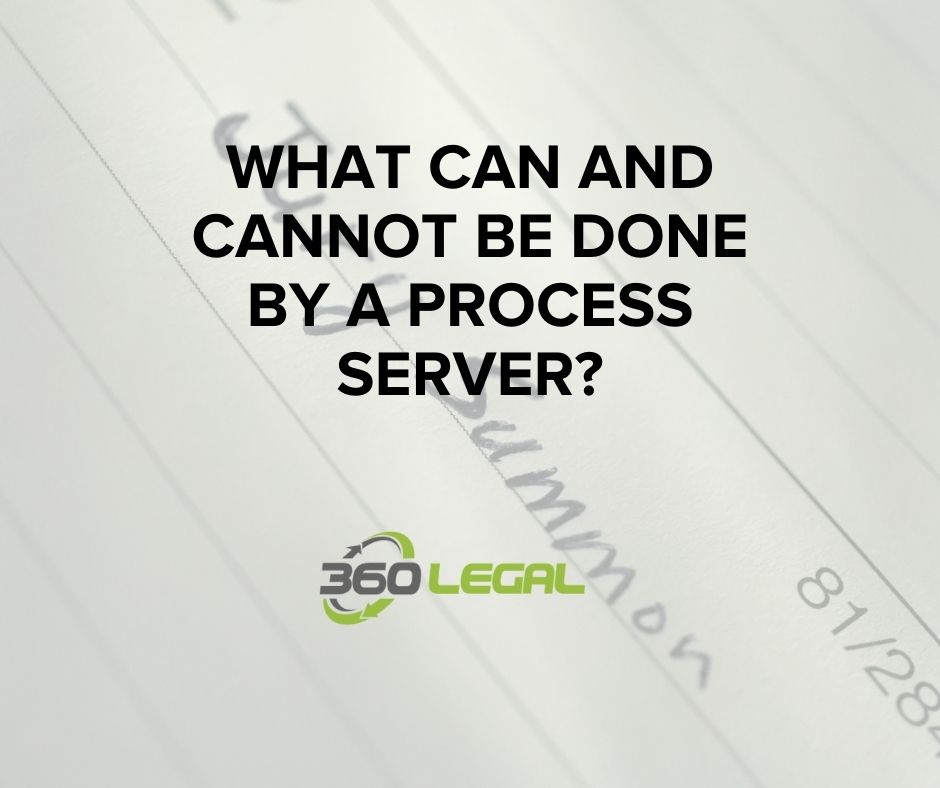Testing RSS Feeds.. ignore post.
Testing RSS Feeds.. ignore post.
What Can and Cannot Be Done By a Process Server

What Can and Cannot Be Done By a Process Server
When you file for divorce, you must serve your spouse with the divorce papers. A process server is frequently used to serve divorce complaints and other divorce pleadings. In Florida, however, a process server must follow the law when serving legal documents.
When attempting to serve papers, a process server cannot break the law, such as trespassing or breaking and entering. As a result, a process server must be able to be creative without crossing the line and doing something they are not supposed to do.
WHAT EXACTLY IS A PROCESS SERVER?
Service of process may be made by anyone over the age of 18 who is not a party to the lawsuit. That person could be a professional process server, or a sheriff’s deputy.
Some people are exempt from the requirement to register as a process server. Officers of the law are not required to register. Attorneys and their employees, as well as anyone appointed by the court to serve its process, are exempt from registration.
Neither licensed private investigators nor their employees are required to register. Professional photocopiers who respond to records production requests and subpoenas are also exempt from the registration requirement.
To serve legal documents, process servers are not required to complete a course or have a specific education. The process server is responsible for knowing and understanding the state’s laws governing the service of legal documents. Process servers must also post a $2,000 bond or cash deposit.
WHAT A PROCESS SERVER CAN OR CANNOT DO?
The primary responsibility of a process server is to deliver legal documents to an individual or party named in the action. The purpose of process service is to notify a party that an action has been initiated or that a relevant document has been filed in the case.
Certain documents in a legal proceeding must be served in a specific way. A document, for example, may state that the process server must personally serve the individual. Personal service is typically performed by identifying the person and handing the document to the person.
Breaking and entering is prohibited.
Most process servers begin personal service by attempting to serve the individual at their residence. Unless the process server unlocks a locked gate or enters a locked building without permission, the process server is not trespassing in most cases.
If the process server is unable to legally enter the property or building, he or she must return or wait for the person to leave. When a person avoids service at his or her home or office, the server may wait until the person leaves before serving the papers in a public place.
Threats or harassment cannot be used to serve papers.
A process server has no authority to compel someone to open a door. The server cannot threaten or coerce the person into allowing entry or accepting the document.
It is not permissible to pose as a law enforcement officer.
A process server may not pose as a police officer or other court official in order to force someone to open a door or accept a document. If a person refuses to open a door, it is illegal for the process server to pose as a law enforcement officer in order to force the person to do so.
A Process Server Has the Authority to Stakeout a Person
While a process server is not permitted to harass or stalk a person who is being served with legal documents, the law does not prohibit a process server from waiting outside a home or business for the person to exit. If the process server believes the person will visit a known friend or family member’s home, the server may also wait in front of that home.
It is not permissible to leave papers with a minor.
It may be tempting for a process server to leave the papers with anyone who answers the door, especially if a party is attempting to avoid service. The process server is not permitted to leave the papers with anyone under the age of 18. If the person is evasive, the server may leave the papers with a member of the adult household.
WHAT HAPPENS IF THE DOCUMENTS ARE UNABLE TO BE SERVED?
If a process server is unable to serve the person, the attorney may file a motion with the court requesting that the person be served in another manner. A motion to serve by public notice may be granted by the court. An experienced family law attorney knows what to do if a spouse or other party refuses to serve family law documents.
T: +1 (888) 360-legl (5345)
@: info@360legal.net
Author
We are Social!
Latest tweets
Popular Tags
Testimonials
"5 star service ! prompt serving, helpful, professional . "
"Mike is awesome. Our firm has hired him on several occasions and we are very happy with his work. His prompt serving, helpful, professional and always in communication. I recommend him highly! "
"360Legal provides speedy and easy to use Process Service that is flexible, and very transparent with nearly instant reporting. It is very helpful for us to be able to track the status of our process service jobs, especially when they are time sensitive. "
Latest News
-

RMAI 2021 Annual Conference RMAI Annual Conference
April 12-15, 2021 -

NATIONAL CREDITORS BAR ASSOCIATION 2020 SPRING CONFERENCE
May 19-21, 2021 -

ALFN ANSWERS 2021
Jul 18-21, 2021 -

Annual Convention and Expo
Oct. 17-21, 2021 -

Florida Association of Professional Process Servers 33rd Quarter Board Meeting/Professional Beach Getaway
Aug. 20-22, 2021












